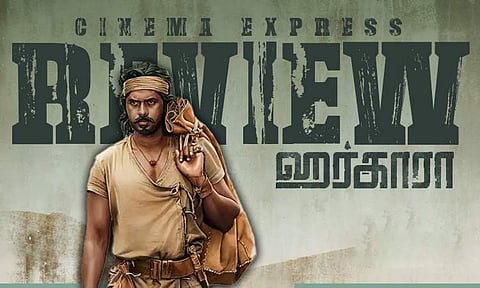Harkara Movie Review: Weak screenplay pulls down this well-intended film
Rating:(2.5 / 5)
Ever since I walked out of the theatre after watching Harkara, the song ‘Anjalkaaran’ has been reverberating in my head, and so is the film’s core theme. Albeit being an interesting page from the history of India’s first postman, the over-dramatised screenplay makes it a run-of-the-mill film.
Helmed and performed by Ram Arun Castro, Harkara is the story of two postmen from two different timelines. In the present, Postman Kaali (Kaali Venkat), is assigned duty in the obscure foothill of Keezh Malai, but he wishes to get a transfer from the underdeveloped tribal village. Does he change his mind after listening to the story of India’s first postman Madheshwaran/Harkara (Ram Arun Castro)? tells the rest of the film.
Ram's staging is brilliant, as we get hooked on to the conflicts faced by Kaali within the first 20 minutes. For instance, the film begins with a scene where a woman from the village wakes Kaali up, in the dead of night for her savings money, effectively highlighting how naive and atypical the local people are.
As we get hooked on to the narrative, Kaali starts climbing uphill to deliver a letter to Mariyammal, who has been awaiting it for years. Unfortunately, this is the point where the film’s engaging factor starts tumbling down and it takes a while to get back on track.
It is said that the postal services played a key role in delivering government secrets and important messages to the most inaccessible regions across the country, nay, the world. The flashback portions of Harkara, where we travel into the life of Madheshwaran, give us a glimpse into this postal history. We are shown that the Harkaras are trained in martial arts, medicine, and a host of other skills. As these portions, featuring Ram Arun Castro start to become compelling, the avoidable storylines and hurried conflict resolutions, make the stretch feel lacklustre.
We see a great amount of time dedicated to Madeshwaran’s love story with Durga (Gautami Chowdry). Especially the love song that pops up just as the film gets gripping, becomes the last straw on the camel’s back. It is a wonder that these portions weren't trimmed down in the edit table, as the conflict resolution in the flashback involving the Britishers and their despotism feels quite hurried and flat.
It is in these portions we expect Harkara to wear nationalism on its sleeves and accentuate the heroics of the man who stood up for his people. But the film fails us, as it resorts to an overdose of melodrama. Also, Madheshwaran's decision to rebel against his long-trusted British master, feels so hasty and forced, making him feel like a lesser hero.
Don’t get me wrong. The Harkara’s sacrifice at the end did manage to wet my eyes. But, rather than being an instant tear-jerker that highlights the physical torturing of the protagonist, perhaps smarter writing that explores his emotional battles would have left us with a longer-lasting effect.
All this said and done, Harkara does end with sweet surprises. No points for guessing whether Kaali changes his mind or not in the end. But, it is quite heartening that it is a personal encounter that triggers Kaali's change of heart aside from the sacrificial tale of Harkara. Ram Arun Castro neatly envelopes a neglected aspect of the Postal services at the end of the film, which stays with us even after we step out of the theatres. So it is safe to say that his message posted to the audience has been safely delivered to our hearts, despite the obstacles on the way.

